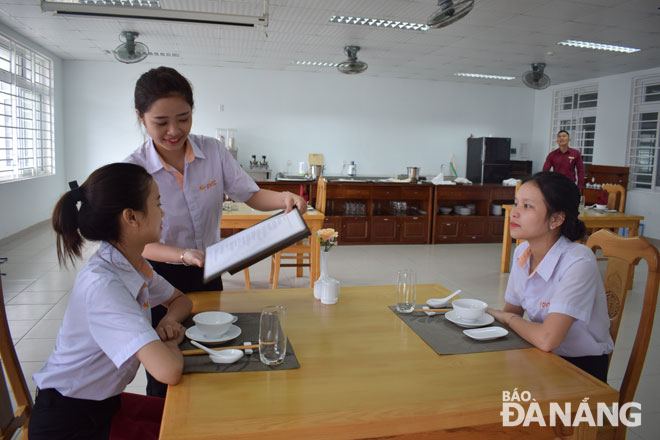Hospitality sector faces shortage of qualified human resources
In recent years, Da Nang’s tourism sector has experienced rapid growth to become one of the fastest growing economic sectors in the city. However, the sector is facing a severe shortage of qualified staff.
 |
| A student from the Da Nang Tourism junior College practising as a waitress at a local restaurant. |
According to the municipal Department of Tourism, there are currently about 40,153 employees in the tourism sector, an increase of 4,071 against last year. Nevertheless, the number of qualified employees currently account for only 65% of the total working in the local tourism sector.
Ms Le Thi Ai Diep, the Head of the municipal Tourism Department’s Accommodation Service Management Division, explained that the reason for the serious lack of human resources in the tourism sector is that the city has seen rapid growth in the number of visitors and accommodation establishments over recent years.
She added a total of between 3,000 and 3,500 new hotel rooms are put into operation in the city every year. During the 2017-2020 period, the city is likely to have seen an increase of 6,000 rooms in total in local hotels. As a result, the tourism sector will be in need of more 4,000 employees. In addition, the city is facing a shortage of 400 tour guides able to communicate in Korean and Chinese languages.
General Secretary of the municipal Hotels’ Association Nguyen Minh emphasised the city is seriously lacking of qualified staff in the tourism sector, especially those who are able to get leadership positions as managers and heads of departments in its 4 to 5-star hotels and resorts.
“Since 2015, between 10 and 15 new accommodation establishments in 4 and 5-star hotel segment have been opened in the city, and up to 60% of managers working in this segment have been invited from luxury hotels in Hoi An, Nha Trang, and Ho Chi Minh City because the local tourism staff do not meet the requirements of local hotels and resorts” Mr Minh added.
He, however, underlined that it is very hard for such hotels to recruit and retain these employees because the salary paid for them in Da Nang is about 30% lower than that in Ha Noi and Ho Chi Minh for the same position”,
Most notably, training programmes at local universities and junior colleges have yet to keep pace with the recent rapid growth of tourism sector.
Most of the city’s universities and junior colleges have mainly focused on providing only training programmes on tourism administration skills. Therefore, graduates from the tourism faculties of local universities and junior colleges have a good background knowledge, but they lack management experience, foreign language proficiency, and other soft skills.
In attempting to solve the problem, many tourism businesses have taken the initiative to organise international-standard training programmes for their employees.
Also, many universities, junior colleges and intermediate schools across the city have made great efforts to help their undergraduates acquire professional skills and real experience through their professional training programmes to meet the requirements of recruiters after their graduation.